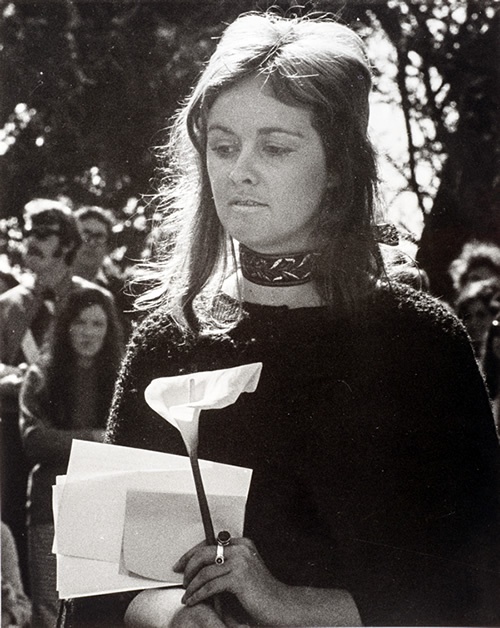
Sue Kedgley was a leading spokesperson for the women’s liberation movement in New Zealand. She initiated Auckland University’s women’s liberation group and fought for change on multiple fronts, spearheading protest marches, giving public talks and advocating for changes in the law. She wrote numerous columns on feminist issues and in 1972 published her first book, Sexist society.
Like the early suffragists, second-wave feminists employed a variety of tactics to fight for change. An early protest march highlighting the lack of progress since women won the vote in 1893 ended under the statue of Queen Victoria in Auckland’s Albert Park, a destination chosen to symbolise the need to move on from Victorian attitudes towards women.
Protest at Albert Park in 1971 and interview with Sue Kedgley on what they wanted.
In the early 1970s Auckland University was a hotbed of activism on a wide range of issues, including the Vietnam War, nuclear testing in the Pacific and Māori land rights. In this environment Sue Kedgley and the Auckland women’s liberation group initiated many of New Zealand’s first second-wave feminist events, including a 1972 visit by Germaine Greer – famous for her ground-breaking book, The female eunuch.
Along with Connie Purdue, Kedgley was instrumental in establishing the National Organisation for Women (NOW) and helped organise the first United Women’s Convention in Auckland in 1973, timed to coincide with the 80th anniversary of women’s suffrage. Fifteen thousand women (and a few men) gathered to debate key issues.
In the early years of women’s liberation, feminist groups aimed to be inclusive of all women, whatever their class, culture, beliefs or sexuality. They wanted to raise awareness of women’s oppression and encourage solidarity amongst women. Equal pay, freely available child-care, free contraception, legalised abortion, and an end to sexism were all on the agenda. Many feminists formed leaderless groups in which decisions were made by consensus. Those involved felt that they were on the verge of changing the world.
Despite this inclusive approach, internal divisions soon emerged. The 1973 United Women’s Convention was split over the emergence of lesbian groups focused on their right to sexual freedom, and over abortion. When a vote confirmed that the majority favoured legalised abortion, 26 women opposed to abortion lobby walked out.
Sue Kedgley continues to fight for women’s rights and equality for all. She worked on women’s issues at the United Nations in New York and has had careers in television and politics at the national and local levels. In 2016 she received the New Zealand Women of Influence Award for Diversity in recognition of her work towards greater gender diversity in the workplace.
In a 2017 interview Kedgley declared that there was much ‘unfinished business’, as women continued to face sexist advertising, domestic violence and pay inequity. For her, feminism is intertwined with environmental issues, health, consumer rights and food safety issues.
Further reading
Barbara Brookes, A history of New Zealand women, Bridget Williams Books, Wellington, 2016
Sandra Coney, Standing in the sunshine: a history of New Zealand women since they won the vote, Penguin Books (NZ), Auckland, 1993
Sue Kedgley on feminism today: https://youtu.be/BEtNr-yT9oo

Community contributions